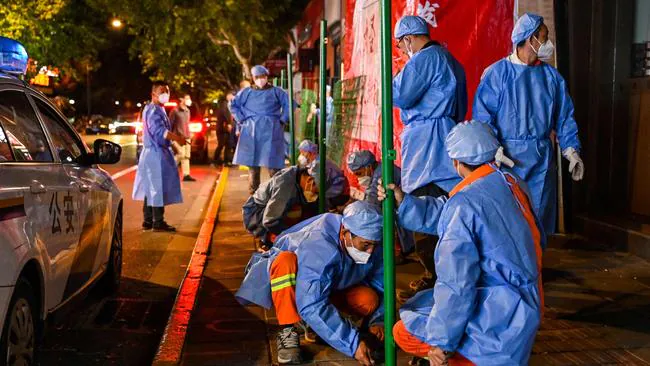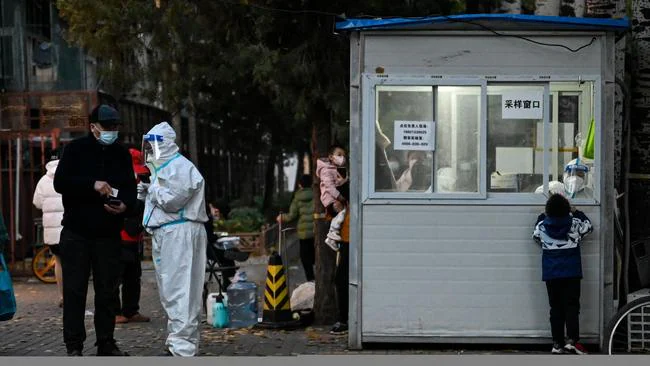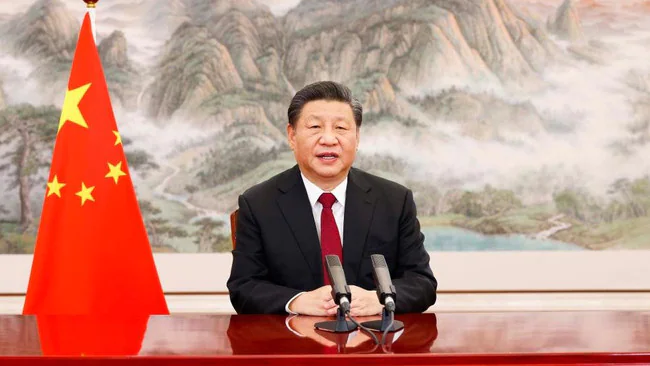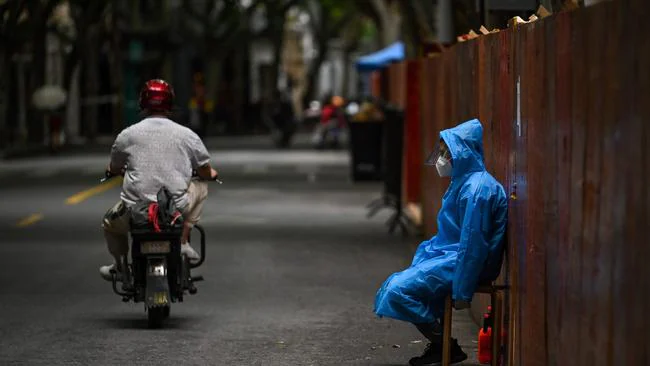Just as Richard Lue described in our seminar on The Digital Prison

A fence is erected around a neighbourhood during lockdown in Shanghai’s Changning district, after new Covid-19 cases were reported last week. Picture: AFP)
- By PHILIP SHERWELL
- THE TIMES
- 12:53PM NOVEMBER 13, 2022
In a place called Happiness, the misery of China’s relentless war on Covid spilled over last week. A husband and wife took their anger to the streets, shouting their complaints, only to be dragged to the ground and beaten by government health workers.
Video of the assault went viral on social media after it was filmed by another resident in Xingfu – meaning “happiness”, the supposedly propitious name of many communities across China – in Shandong province.
As outrage grew, authorities reacted with unusual speed and arrested seven Covid enforcement officers for their actions. The response is understandable: although popular opinion is impossible to gauge in China, there is growing evidence on social media of widespread suspicion that the zealous implementation of the “zero Covid” edict of Xi Jinping, China’s leader, now has more to do with surveillance, politics and propaganda than public health.
Beijing on Friday announced minor tweaks to the Covid rules, shortening quarantine time for travellers and ending detentions for “close contacts of close contacts” of anyone with a positive test.
| THEAUSTRALIAN.COM.AU00:35 Yet on Thursday a Politburo meeting chaired by Xi made clear that his policy, officially called “dynamic zero Covid”, remained unchanged, while calling for more targeted measures to combat the pandemic. For now there is little sign of a further easing of restrictions as China faces its highest infection rate in six months. regulations to ease across China |
Officials in the capital have closed city parks and imposed other restrictions, while four million people in Guangzhou, the southern industrial hub known as the “factory of the world”, were locked down after infections surged there.
In recent days the global financial services group Nomura has estimated that full and partial lockdown measures were affecting regions home to more than 280 million people in China and one eighth of the economy. The country’s GDP growth fell to just 0.4 per cent earlier this year, the second lowest level in three decades, after the closure for business of Shanghai, while unemployment for 16 to 24-year-olds is almost 20 per cent. The collapse of a housing bubble has exacerbated the Covid contraction.
Mass testing and snap shutdowns are the most striking illustration of the policy. More insidious are the contact-tracking smartphone apps based on QR codes that dominate the lives of hundreds of millions of Chinese.
People have to scan the QR code for the most basic activities: entering a shop or restaurant, taking a bus or train, going to the cinema. If the app shows a green result, they can continue. If it’s red, usually meaning they are an undefined “close contact” of someone who tested positive, they are sent to quarantine.
There are fears that the apps, and the public control they deliver, will outlast other restrictions as a permanent feature of China’s surveillance machinery. The code shares a trove of personal data with the regional authorities, including travel history, health records and whom one has met. It may be too tempting for Xi not to institutionalise the system after directing the development of a Big Brother state even before Covid.
Notably, China has introduced the so-called “social credit” programme, handing out economic and professional rewards or exacting punishments to individuals and companies based on database records of their actions. The addition of the QR code system would be a powerful new tool in the regime’s armoury of control.
Indeed, the National Health Commission last week announced plans for a new individual digital medical record system. Although officials denied this was a continuation of the Covid QR code systems, many were in doubt.
“The zero Covid regime has supplied proof that control over every aspect of people’s lives is doable,” said Yanzhong Huang, a Chinese public health expert at the Council on Foreign Relations in New York.
“It’s not hard to imagine that components of the QR code system brought in for zero Covid could be retained to facilitate state control as part of a bigger agenda to re-engineer Chinese society.”

A scandal earlier this year illustrated the scope for abuse when authorities in Henan province manipulated the system to issue fake red codes to prevent people joining protests about frozen bank deposits. On their arrival in the provincial capital from across the country, many people planning to protest said their phones suddenly flashed red when they scanned their QR codes at train stations and hotels. Several were escorted back to their home cities.
Han Yang, a former Chinese diplomat who now lives in Australia, described the public control element as an “unintended consequence” of the Covid policy, but one which the government “simply finds irresistible, especially considering there is very little guardrail in Chinese laws on privacy or individual rights”.
And he noted the similarities with “many previous CCP [Chinese Communist Party] disasters”, such as the Cultural Revolution under Chairman Mao Zedong and the one child policy, which for decades restricted couples to having a single child, leaving the country now with a rapidly ageing population.
“The nature of a Leninist party dictates that the leader seldom gets to hear genuine feedback from the lower levels, so a wrong decision can take ages to be corrected,” he said.
The CCP and state media mouthpieces have regularly extolled China’s “victory” over Covid under Xi as evidence of the superiority of their authoritarian system over western governments. As Xi heads to Indonesia for this week’s G20 summit and his first face-to-face meeting with Joe Biden, such propaganda is of paramount importance for Beijing.
And public health experts note that China does now face the prospect of a devastating casualty toll if it ended its seclusion – as a consequence of its own policy of self-isolation from the world.

Although the pandemic erupted in China in late 2019, most Chinese have not been exposed to Covid-19, and certainly not to more recent variants, leaving the country with an “immunity gap”.
China has relied on Chinese-made early version vaccines that were not developed to deal with variants such as Omicron. Studies have shown they are much less effective than western-made vaccines. And many of the elderly, the demographic most at risk, have not had boosters even of these home-made jabs.

But as Huang noted, the decision to stick with the zero-transmission goal has become purely political. “Decisions on zero Covid have much more to do with politics than public health,” he said. “From a purely public health perspective, it’s not scientific or sustainable.”
Han Yang noted: “Zero-Covid does bring a short-term benefit of the lowest death rate in the world, and with that, the social stability for the majority of the population. But the idea of a modern society being able to eliminate an easily transmitted airborne virus is irrational.”
The deployment of mRNA vaccines from the West and a mass vaccination campaign offered the only “viable” path for China to follow the rest of the world in opening up, he said. “But that would be a serious about-face for Xi.”
The Sunday Times
